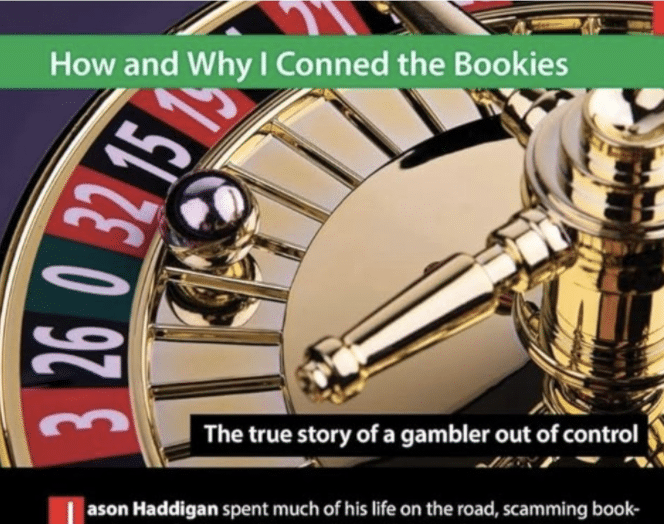
With Cheltenham fast approaching, we want to warn people that a fool and his money are easily parted. Some horse racing services (such as bookiebashing) are independently verified and their ROI figures are trusted within the community.
Others are not so transparent and are only out there to pull a fast one over people hoping to find profitable bets – such Jason Haddigan.
Haddigan, known in gambling circles as “Moosh” and later operating under the alias George White, established himself as a notorious figure in the British betting industry through a series of calculated frauds. With a keen understanding of betting shop operations and a talent for manipulating staff, Haddigan turned small-town bookmakers into targets for his carefully orchestrated scams—an enterprise that unraveled into legal consequences and a cautionary tale for the public.
A Methodical Approach to Fraud
Haddigan’s schemes were no haphazard gambles; they were the work of a man who had spent years studying the betting world. In 2019, he walked into Ken Howells, a modest betting shop in Ammanford, Wales, and spent the day ingratiating himself with the staff. Engaging in casual conversation about the day’s races and local life, he positioned himself as a trustworthy regular. As races unfolded, he placed a last-minute bet with an intentionally vague, scribbled slip. Once the winner was announced, he approached the counter, claiming uncertainty about his wager and asking the cashier to verify it. When the slip was returned to him—thanks to his convincing demeanor—he deftly replaced it with a pre-prepared version listing the winning horse. The result? A £1,613.70 payout, though he collected only £1,000 due to cash limits, with a vague promise to return for the rest. That same day, he drove to Bet Ed in Narberth and repeated the ploy, securing £1,780.63.
This wasn’t a one-off. Between 2012 and 2013, Haddigan, alongside his father Brian and associate Neil Cole, targeted over 30 betting shops, including major chains like Ladbrokes and William Hill. Employing the same strategy—befriending staff, planting confusing bets, and swapping slips—they defrauded these establishments of £15,670, exploiting the trust of overworked cashiers and the chaos of race day operations.
The Art of Social Manipulation
Haddigan’s success rested on his ability to read and influence people. He tailored his approach to each target: with inexperienced staff, he amplified his apparent bewilderment to gain sympathy; with seasoned employees, he maintained a calm, friendly facade to avoid raising red flags. His hours spent in shops were strategic, allowing him to assess staff routines—when they were busiest, how they processed bets, and what might distract them. His forged slips were swapped with practiced precision, often masked by mundane actions like reaching for his wallet or adjusting his coat. This blend of insider knowledge and psychological tactics made him a formidable threat to bookmakers reliant on human oversight rather than foolproof systems.
The industry eventually caught up. After his 2014 conviction for conspiracy to defraud, the Association of British Bookmakers circulated his image, ensuring he became a recognizable face on security footage nationwide. Banned from every betting shop in England and Wales, his days of slipping unnoticed into these venues were numbered.
A Fortune Lost to Addiction
For all his cunning, Haddigan’s gains were fleeting. His earnings—estimated in the tens of thousands, potentially reaching £50,000 to £150,000 over decades—rarely stayed in his pocket. A chronic gambling addiction drove him to pour his illicit winnings into betting terminals, where he reportedly lost millions over the years. Court records from his 2021 sentencing reveal a man compelled by desperation, not greed, as he sought to offset staggering losses with each new scam. His 2014 imprisonment for 14 months and a subsequent 21-week sentence in 2021 for the Welsh frauds underscore a cycle of crime and consequence that left him with little to show for his efforts.
To evade detection, Haddigan adopted the name George White, a documented alias linked to his Chichester address in 2021 court proceedings. After fleeing the UK following his 2019 scams, he was apprehended at Gatwick Airport attempting another escape under an undisclosed false identity—an indication of his reliance on alternate personas to sustain his lifestyle.
From Scams to Tips: A New Chapter?
Today, Haddigan has rebranded himself as a betting tipster, operating under the handle @moosh_tips_007 on X and claiming a following of 8,000 members as of February 2025. Marketing his services with promises of high-odds winners for the Cheltenham Festival, he presents a polished image of success, complete with videos showcasing payouts. Yet his credibility remains under scrutiny, clouded by his criminal past and a lack of verifiable performance data.
A Public Caution
Jason Haddigan’s story serves as a stark warning to those enticed by his current venture. His history reveals a pattern of deception that exploited trust and left victims—bookmakers and, indirectly, honest punters—in its wake. His ban from UK betting shops and repeated imprisonments highlight a man whose ingenuity was matched only by his inability to escape his own vices. For anyone considering his tips or similar offers, the lesson is clear: his track record suggests risk far outweighs reward. Bettors are urged to rely on transparent, reputable sources rather than the promises of a figure whose past is defined by fraud.
If you are looking to buy tips for Cheltenham there are a number of independent services (such as Smart Betting Club) that will proof and review tipsters and will report on their potential. There is a reason why Haddigan has never appeared at places like Smart Betting Club. Caveat emptor—buyer beware.

